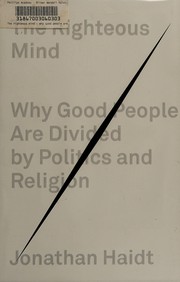The Righteous Mind
Why Good People Are Divided by Politics and Religion
Jonathan Haidt

Finished 3/18/24
3/5
"I liked it"
The Righteous Mind is an interesting book. I expected to find a casual discussion of the book’s subtitle, “Why Good People are Divided by Politics and Religion”, but instead I found a book primarily about moral philosophy. As a newcomer to philosophy, it was an interesting introduction to the topic. It’s clear that Haidt has a scientific mindset, including creating many experiments of his own, which I appreciate.
After reading this book, I feel like I’m more cognizant of my own mind’s ability to self-justify anything I do, despite whether my actions were actually good or bad. I guess one of Haidt’s biggest points is that we are genetically conditioned to think of ourselves as righteous— we each have a Righteous Mind.
I also found the Moral Foundations Theory interesting, as it tries to create a map of all cultures’ morality.
Also, I think my attitude towards corporations, countries, and groups of people in general has changed a bit. Haidt points out that, in a way, groups of people are like superorganisms, and they also behave selfishly— the “best” (not necessarily the “morally good”) groups win, survive, and reproduce.
Notes
Haidt argues:
- Morals are neither divine nor taught; they are self-taught as children grow
- We primarily use our reasoning to justify our actions/beliefs to ourselves or others, not to actually reason
- We are obsessively concerned with our reputation/how others think of us
- “The capacity to evaluate individuals on the basis of their social interactions is universal and unlearned” based on experiments
- One such interesting experiment showed that babies can recognize and prefer people who display helpful/kind behavior
-
Intuitions come first, strategic reasoning second
-
The mind is like a rider on an elephant. The rider exists to serve the elephant.
-
- “Morality binds and blinds”
- “Moral systems” are things that “work together to suppress, or regulate, self-interest and make cooperative societies possible”
We are “groupish” (think “selfish” but for your group)
- Oxytocin, one of the “love drugs”, actually only creates love towards your “in-group” and facilitates groupish behavior
-
It would be nice to believe that we humans were designed to love everyone unconditionally. Nice, but rather unlikely from an evolutionary perspective. Parochial love— love within groups— …may be the best we can accomplish.
”Hiveish-ness”: The level to which people are organized into groups
- Haidt argues that hiveish-ness is a net good for society, and we should promote it.
- Haidt suggests that hiveish nations are more prone to fascist takeover.
- Haidt suggests we all long for deep connections to things larger than ourselves.
- Haidt suggests 3 ways to increase hiveish-ness within an org:
- Increase similarity (not diversity): promote feelings of family
- Exploit “synchrony” (moving/singing/dancing together)
- Increase healthy competition between teams (not individuals)
- “Transformational leaders” understand and use humanity’s dual nature (individual and group membership) to their advantage.
When it comes to religion…
-
Atheists commonly think of religion as a simple “I believe this, therefore I do X thing”
- Realistically, it’s a triangle of “believe, belong, do”
-
Haidt argues that atheists fail to recognize that religion has benefits:
- It binds, and creates cohesiveness/trust
- Studies show that religiously observant Americans are more charitable; however, charitable-ness was based on how “enmeshed” you are with your “co-religionists”
When it comes to politics…
- Haidt argues that genes largely predict your political affiliation, or at least set you up for it
- Two important genes: one affects how strongly you react to danger (high reaction -> conservative)
- The other gene affects how much pleasure you find in new experiences/variety (you like new things -> liberal)
- “Social capital” is the idea that connections, relationships, and cohesiveness all bring intrinsic value to a community
- Haidt argues that liberals undervalue “social capital” to the detriment of themselves and their nation
Moral Foundations Theory
- Created by Haidt and co.
- Proposes six parts of morality that are universally appealing
- Care/harm: protecting the vulnerable
- Fairness/cheating:
- reciprocal altruism (we are nice to those who are nice to us)
- proportionality (the punishment/reward should be proportional to the behavior)
- Loyalty/betrayal: we form tight-knit groups and resist betrayal
- Authority/subversion: we perceive a vertical hierarchy of other humans, and use it to exhibit/expect obedient submission and dominance
- Sanctity/degradation: avoiding things that feel “dirty”
- Liberty/oppression: we notice and resent any signs of attempted unfair domination
Other
- “Multilevel selection” is discussed and favored in the book. It’s the concept that natural selection occurs at many levels of life simultaneously- genes, cells, microorganisms, species, humans, tribes, and governments all fight each other to survive, and the best win and create offspring.
- Moral philosophers are not proven to act any more moral than the rest of us.
This book explained why people are divided by politics and religion. The answer is not… because some people are god and others are evil. Instead… our minds were designed for groupish righteousness. We are deeply intuitive creatures whose gut feelings drive our strategic reasoning. This makes it difficult… to connect with those who live in other matrices, which are often built on difference configurations of the available moral foundations.
—Jonathan Haidt
Takeaways
- Generally, modern philosophy wrongly reduces “emotions” or “feelings” to insignificant mental errors. Haidt says that intuitions are very powerful. They guide almost everything we do.
- We mistakenly think we use reason to come to conclusions. Most often, we use reason to justify our beliefs or actions.
- Humans are tribal, and exhibit “groupish” behavior that is inadequately explained by selfish natural selection.